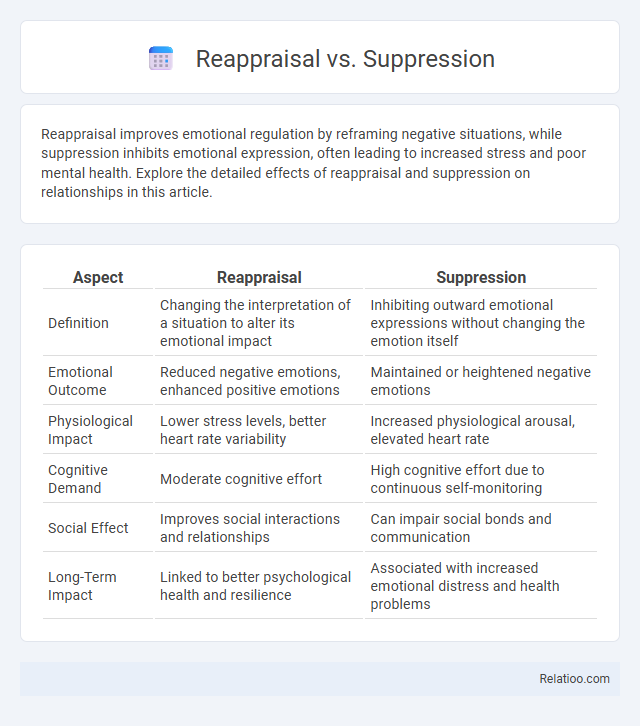Reappraisal improves emotional regulation by reframing negative situations, while suppression inhibits emotional expression, often leading to increased stress and poor mental health. Explore the detailed effects of reappraisal and suppression on relationships in this article.
Table of Comparison
| Aspect | Reappraisal | Suppression |
|---|---|---|
| Definition | Changing the interpretation of a situation to alter its emotional impact | Inhibiting outward emotional expressions without changing the emotion itself |
| Emotional Outcome | Reduced negative emotions, enhanced positive emotions | Maintained or heightened negative emotions |
| Physiological Impact | Lower stress levels, better heart rate variability | Increased physiological arousal, elevated heart rate |
| Cognitive Demand | Moderate cognitive effort | High cognitive effort due to continuous self-monitoring |
| Social Effect | Improves social interactions and relationships | Can impair social bonds and communication |
| Long-Term Impact | Linked to better psychological health and resilience | Associated with increased emotional distress and health problems |
Understanding Emotional Regulation
Reappraisal involves changing the way one thinks about a situation to alter its emotional impact, making it a cognitive strategy that effectively reduces negative emotions and enhances psychological well-being. Suppression, by contrast, focuses on inhibiting the outward expression of emotions without addressing their internal experience, often leading to increased physiological stress and decreased social connection. Understanding the differences between reappraisal and suppression is crucial for emotional regulation, as reappraisal promotes adaptive coping and emotional resilience, whereas suppression may contribute to emotional difficulties and impaired interpersonal relationships.
What is Reappraisal?
Reappraisal is a cognitive emotion regulation strategy where you change the way you interpret a situation to alter its emotional impact, promoting healthier emotional responses. Unlike suppression, which involves inhibiting outward emotional expressions, reappraisal targets the root of emotional experience by reframing thoughts before emotions fully develop. Understanding reappraisal enhances your ability to manage stress and improve psychological well-being effectively.
What is Suppression?
Suppression is a form of emotion regulation involving the conscious inhibition of emotional expressions after an emotional response has been generated. Unlike reappraisal, which changes the interpretation of a situation to alter its emotional impact, suppression targets the outward display of emotions without modifying the internal experience. Research shows that suppression can lead to increased physiological stress and decreased social connection compared to reappraisal strategies.
Key Differences Between Reappraisal and Suppression
Reappraisal involves changing your interpretation of a situation to alter its emotional impact, while suppression focuses on inhibiting the external expression of emotions without changing the internal experience. Reappraisal is linked to better psychological well-being and reduced physiological stress, whereas suppression often results in increased negative emotions and higher cardiovascular reactivity. Understanding these key differences helps you choose more effective emotional regulation strategies for improving mental health.
Benefits of Reappraisal
Reappraisal, as an emotion regulation strategy, enhances psychological well-being by reframing negative thoughts into more positive or neutral interpretations, thereby reducing stress and anxiety. Unlike suppression, which involves inhibiting emotional expression and can lead to increased physiological arousal and depressive symptoms, reappraisal fosters healthier emotional processing and improved cognitive flexibility. Research demonstrates that consistent use of reappraisal correlates with better social functioning, greater resilience, and long-term emotional stability.
Drawbacks of Suppression
Suppression, a common emotion regulation strategy, often leads to adverse psychological and physiological consequences, including increased stress and impaired memory performance. Unlike reappraisal, which alters emotional responses by changing the interpretation of a situation, suppression merely inhibits outward expressions without reducing internal emotional intensity. This discrepancy results in greater cognitive load and decreased social functioning, highlighting suppression's drawbacks compared to more adaptive strategies like cognitive reappraisal.
Psychological Effects: Reappraisal vs Suppression
Reappraisal, a cognitive emotion regulation strategy, involves changing the interpretation of a situation to alter its emotional impact, leading to healthier psychological outcomes such as reduced anxiety and depression. Suppression, by contrast, entails inhibiting emotional expressions, often resulting in increased physiological stress and negative mental health effects due to unresolved emotional responses. Research consistently demonstrates that reappraisal promotes long-term emotional well-being and cognitive flexibility, whereas suppression is linked to heightened emotional distress and impaired social functioning.
Impact on Mental and Physical Health
Reappraisal, a cognitive emotion regulation strategy, consistently links to improved mental health by reducing anxiety and depression symptoms and enhancing overall emotional well-being. Suppression, involving the inhibition of emotional expression, correlates with increased physiological stress responses, such as elevated heart rate and cortisol levels, negatively impacting both mental and physical health. Reappraisal demonstrates more adaptive outcomes by fostering psychological resilience and lower risk of stress-related health issues compared to suppression.
Practical Applications in Daily Life
Reappraisal involves reframing negative thoughts to alter emotional impact, enhancing mental health and stress management in daily situations like work or social interactions. Suppression, which entails inhibiting emotional expression, may provide short-term relief but often leads to increased stress and impaired relationships over time. Regular use of reappraisal improves emotional regulation and decision-making, making it a more effective strategy for maintaining psychological well-being compared to suppression.
Choosing the Right Emotional Regulation Strategy
Choosing the right emotional regulation strategy depends on the context and your long-term goals. Reappraisal involves changing how you think about a situation to alter its emotional impact, often leading to healthier mental outcomes compared to suppression, which involves inhibiting emotional expression but can increase stress and physiological arousal. Understanding when to use reappraisal over suppression empowers you to manage emotions more effectively, enhancing emotional resilience and well-being.

Infographic: Reappraisal vs Suppression
 relatioo.com
relatioo.com